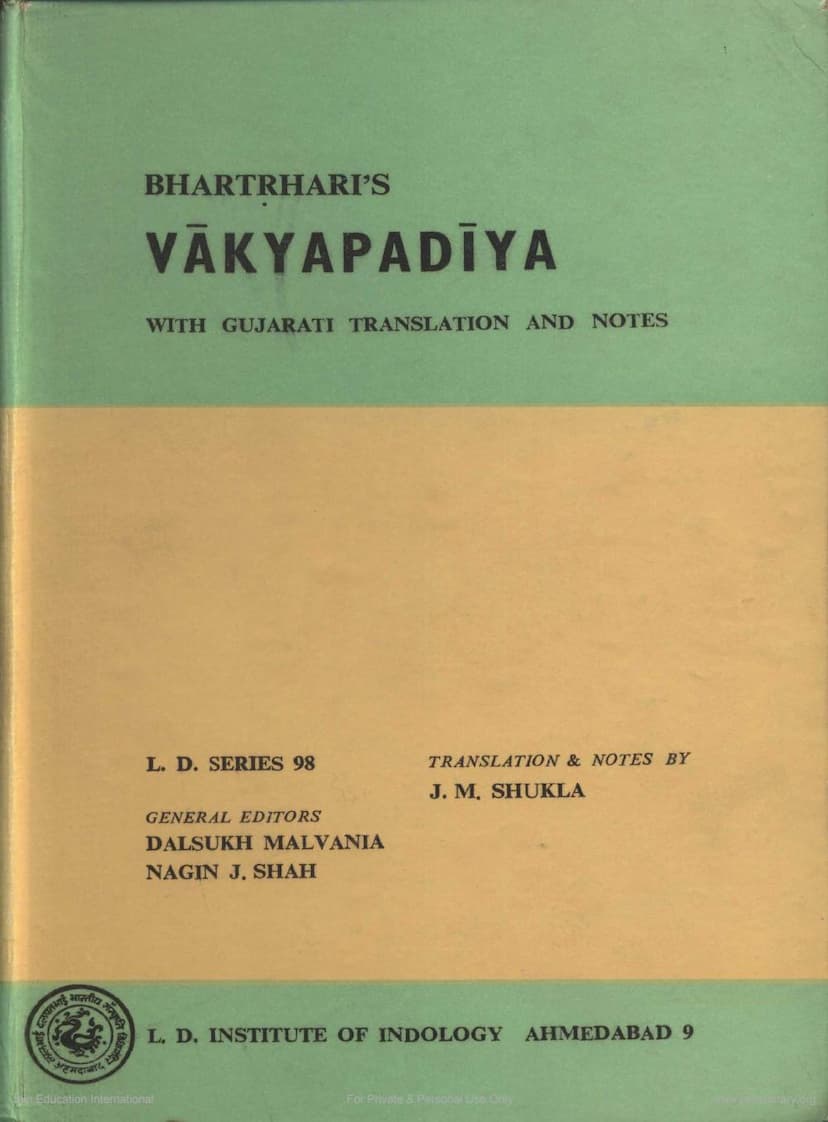Vakyapadiyam
Added to library: September 2, 2025

Summary
Here's a comprehensive summary of the provided Jain text, the Vākyapadīya, based on the extensive Gujarati translation and notes you've shared:
Title: Vākyapadīya Author: Bhartṛhari Publisher: L. D. Indology, Ahmedabad Translator & Annotator: Jaydev M. Shukla Series: L. D. Series 98 General Editors: Dalsukh Malvania, Nagin J. Shah
Overall Scope and Significance:
The Vākyapadīya is a monumental work by the philosopher-grammarian Bhartṛhari, highly revered in Indian philosophical and grammatical traditions. It's not merely a treatise on grammar but a profound exploration of the philosophy of language, consciousness, and reality, seen through the lens of linguistic principles. The text posits the ultimate reality (Brahman) as synonymous with sound (śabda), a concept that deeply influenced various Indian philosophical schools, including Advaita Vedanta. Bhartṛhari's ideas have been discussed, debated, and integrated by thinkers across diverse traditions, from Buddhist logicians like Dignāga and Dharmakīrti to Mīmāṁsakas like Kumārila and Prabhākara, and Śaivas like Abhinavagupta. The Vākyapadīya is considered indispensable for understanding the philosophy of grammar in India.
Structure and Content:
The Vākyapadīya is divided into three Kāṇḍas (books or sections):
-
Brahma Kāṇḍa (also called Agama Kāṇḍa or Shabda-tattva Kāṇḍa):
- This section, comprising 183 kārikās (verses), introduces the fundamental concept of Śabda-brahman (sound-Brahman) as the ultimate, eternal, and unmanifest reality.
- It establishes that this Śabda-brahman is the source of all existence, the substratum of the universe, and the ultimate knowledge.
- Bhartṛhari argues that Śabda is the cause and essence of everything, including consciousness and the world itself.
- The text discusses the nature of śabda (sound), its manifestation from the imperceptible (parā) to the audible (vaikharī), and the relationship between sound, meaning, and consciousness.
- It emphasizes the Vedas as the primary means to realize Śabda-brahman and highlights the significance of grammar as the path to understanding it.
- Bhartṛhari refutes the idea of arbitrary word-meaning relationships, asserting an eternal connection.
- The section also delves into the nature of sound, phonetics (varna), the relationship between sound and meaning, and the various theories about the origin and essence of words.
-
Vākya Kāṇḍa (also called Svarūpa Kāṇḍa or Prakīrṇa Kāṇḍa):
- This extensive section, with 490 kārikās, focuses on the Vākya (sentence).
- It analyzes different theories of what constitutes a sentence, exploring concepts like meaning, relationship between words, sentence constituents, and the unity and entirety of a sentence.
- Bhartṛhari discusses the role of Pratibhā (intuitive insight or spontaneous cognition) in understanding the meaning of a sentence.
- The section examines the relationship between words and their meanings, the nature of meaning itself, and how meaning unfolds in a sentence.
- It critiques various philosophical positions, including those of the Mīmāṁsakas and grammarians, on sentencehood and meaning.
- Key concepts like the relationship between word and meaning, the role of intention (vivakṣā), and the perceived unity of a sentence are explored.
-
Pada Kāṇḍa (also called Dravya Kāṇḍa or Padārtha Kāṇḍa):
- This is the longest section, with 1325 kārikās, and it delves into the Pada (word) and its various aspects.
- It systematically analyzes linguistic categories and philosophical concepts related to words and their meanings.
- Key topics include:
- Jāti (Universal): The nature of universals, their relationship to particulars, and how words refer to them.
- Dravya (Substance): The philosophical concept of substance, its attributes, and its relation to language.
- Sambandha (Relationship): The nature of the relationship between words and meanings, exploring theories of convention, natural relation, and causation.
- Kāraka (Grammatical Categories): An in-depth analysis of grammatical case relations (kāraka) like kartṛ (agent), karma (object), karaṇa (instrument), sampradāna (dative), apādāna (ablative), and adhikaraṇa (locative).
- Kriyā (Action): The philosophical underpinnings of action, its temporal aspects, and its relation to causality.
- Kāla (Time): The nature of time, its divisions, and its role in language and reality.
- Puruṣa (Person): The grammatical categories of person (first, second, third) and their relation to consciousness.
- Saṅkhyā (Number): The concept of number and its grammatical application.
- Liṅga (Gender): The philosophical and grammatical understanding of gender in language.
- Vṛtti (Semantic Relation/Mode): Various semantic relations like taddhita, samāsa, and ekśeṣa.
- Upamāna (Analogy): The role of analogy in language and meaning.
- Upagrah: This section likely discusses various grammatical operations or nuances related to verbal roots and affixes.
Bhartṛhari's Philosophical Standpoint:
- Śabda-brahman: Bhartṛhari's central thesis is that Śabda-brahman (sound-Brahman) is the ultimate reality, the source and essence of all existence. Language is not merely a tool for communication but a manifestation of consciousness and reality itself.
- Eternal Nature of Śabda: He argues for the eternality and immutability of Śabda-brahman, which underlies the transient nature of the phenomenal world.
- Pratibha: Bhartṛhari emphasizes the role of pratibhā – an intuitive, spontaneous understanding – in grasping the meaning of sentences. This insight is crucial for comprehending the intended meaning beyond literal word-meanings.
- Monism: The work leans towards a monistic philosophy where the ultimate reality is Śabda-brahman, and the diversity of the world is seen as its manifestation or transformation (vivarta).
- Grammar as Philosophy: He elevates grammar from a mere technical discipline to a philosophical system, demonstrating how linguistic structures reveal profound metaphysical truths.
The L. D. Series Edition:
This specific edition, published by L. D. Institute of Indology, Ahmedabad, is valuable for its inclusion of a Gujarati translation and detailed notes. The translation and notes by J. M. Shukla are intended to make Bhartṛhari's complex ideas accessible to Gujarati-speaking scholars and enthusiasts of Indian philosophy. The edition also acknowledges the financial assistance of the Government of Gujarat and the collaborative effort of the General Editors. The preface by N. J. Shah and the foreword by J. M. Shukla highlight the text's importance and the translator's expertise.
In essence, the Vākyapadīya is a philosophical masterpiece that intricately weaves together the study of language with profound metaphysical insights, exploring the ultimate nature of reality as revealed through the power and structure of sound and speech.